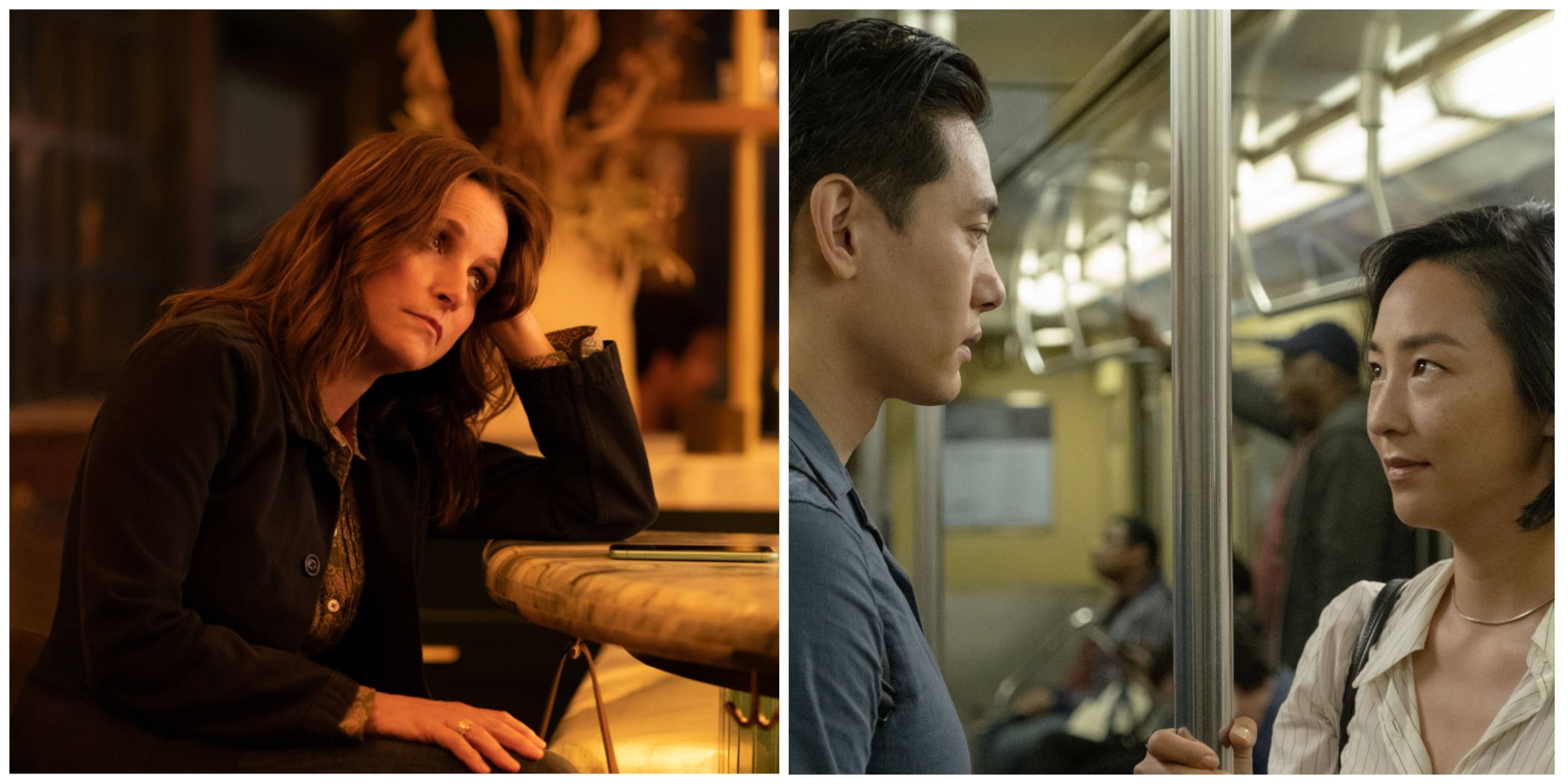A Korean man, a Korean woman, and a white man are sitting at a bar, and, offscreen, two voices guess at the relationship between the three. Are the Koreans a couple? If so, who’s the white guy they’re barely acknowledging? Maybe they’re just coworkers? It’s all ordinary night-out chit chat, nothing too heavy, until the woman turns to face us, and the ambivalence of her expression suggests a deeper mystery than the one under discussion.
Past Lives begins with this intriguing moment, which inadvertently gets at the central flaw in Korean-Canadian playwright Celine Song’s critically celebrated debut film. The relationship between these three people does seem complex and uncertain if you stand back far enough, but the closer you approach them the simpler their story is. Which is the opposite of how you want a movie to work, no?
Na Young (Greta Lee) and Hae Song (Teo Yoo) are tween sweethearts in Korea who separate when her family emigrates to Canada. Now known as Nora, Na Young eventually moves to New York; a budding playwright, she meets Arthur (John Magaro) at a writer’s residency. The two hit it off, marry (a little sooner than planned, she later admits, to secure her green card), and become relatively successful writers, as one does when moving to New York in movies like this. (Or if one is Celine Song, for whom Nora is something of a stand in.)
But Hae Song, whose life is drab and predictable in Seoul after he completes his compulsory military service, still wonders about his first crush. And so, as we all do late at night when we’re lonely and have internet access, he hunts for her online. Twelve years after they last saw each other, the two reunite on Facebook and begin Skyping regularly. They vaguely discuss meeting up, but Nora suddenly ends their communication, considering it a distraction from her life and career.
All this, more than half the film, plays out like an extended introductory montage—we brush through these encounters without ever quite meeting these characters, without settling into the rhythms of their lives, and their only significant onscreen interactions are with one another. Only when Hae Song arrives in New York, 12 years after he and Na Young stop Skyping, do these three begin to reveal themselves as individuals. After too much windup and not enough pitch, we’re left on the precipice of a satisfying film that practically ends where it should begin.
Hae Song has clearly come to see Nora, whether to recapture his youth or with something more romantic in mind. Nora relates to Hae Song as a connection to a Korea she left long ago, as a way to explore her conflicting emotions to her heritage. Arthur seems embarrassed to find himself slightly jealous of Nora’s relationship with Hae Song (if that’s even the word for it), and, in the film’s most emotionally forthright scene, reveals long-unexpressed insecurities to her as they lay in bed. All this is certainly something for a writer to work with.
But Past Lives is unduly chaste, and leaves too much unsaid. Hae Song clearly feels a certain way about Na Young, but, I mean, is he hot for her or not? (Yoo has the most difficult role here, trapped as he is in what the film understands as cultural norms of politeness and obliqueness, not to mention a script that barely gives him any inner life.) And while Greta Lee’s nuanced performance does fill in some of the blanks that Song leaves about Nora’s intentions, it’s hard to guess what she feels during those intimate Skype sessions, and she never seems close to crossing the line into even mental infidelity. As for Arthur, he settles his issues well before meeting his not-exactly-rival. As a result of all this, the stakes feel much lower than the film pretends they are.
In the pathetic Vox explainer culture of ours, where audiences demand that every character’s word and deed be strictly accounted for, you’d expect critics to fall for any movie confident enough to leave things unsaid. (I still shrivel inside when I remember overhearing a couple leaving The Silent Twins, Agnieszka Smoczyńska’s slightly underrated movie about troubled and institutionalized sisters June and Jennifer Gibbons, who were upset that we didn’t get to see "the trauma that made them act like that.") But what Song offers as subtlety feels more like vagueness, and it’s not like she’s immune to over-explicating—what is Past Lives’ prolonged preface but the arthouse version of a superhero’s origin story?
The film’s title has a double meaning. There are the lives we lived in the past, when we were people we may or may not continue to be. But as Hae Song, Nora, and Arthur bandy about the Korean concept of in-yung, or the interconnectedness of beings from one reincarnation to the next, “past lives” takes on a spiritual, supernatural sense that feels like writerly distraction from the characters themselves. When she first mentions in-yung to Arthur, Nora jokes that it’s “just something Koreans say to seduce someone.” It may also be something Korean writers use to give their story undue cultural heft.
At times, I wondered if Past Lives might reveal more if Song had played its scenario for laughs. At least that would have allowed the movie to dislodge itself from its strict focus on the characters’ perspectives, to crack them open and let us see who they are. In some ways, we still know as little about Nora, Hae Song, and Arthur when the film ends as the people across the bar did when it began.
You know exactly who the people in You Hurt My Feelings are, even if you’ve never seen a Nicole Holofcener movie before. After all, one of them is played by Julia Louis-Dreyfus, which alone plops you down quite nicely in a familiar enough world. We’re among Manhattan professionals, comfortable enough though their jobs and lives bring them in proximity to the truly affluent often enough to make them resentful. (Then again, Nora and Arthur would fume in jealousy at how these folks live—sorry kids, shoulda bought before the boom.)
But these people are also insecure, and on top of that they’re anxious about their insecurities, and that only makes them more insecure, which only makes them more anxious. And so on. The question that You Hurt My Feelings centers on—“What if I suck at my job and everyone knows it but me?”—is one that anybody with a personal investment in their career has asked at some point. (Well, not me, of course, but I’m guessing the rest of you have). You might even call it a universal question, while acknowledging that the universe these people inhabit is rather small and in fact contracting.
Louis-Dreyfus is Beth, the author of a memoir that sold adequately and received mildly approving reviews—the sort of lukewarm response that’s poison to a neurotic like her. Beth has just finished her first novel, and her agent is far from sold on it. All of which is to say that she’s already not at her most emotionally balanced when she overhears her husband Don (Tobias Menzes) saying he’s not so crazy about the new book himself.
As Beth struggles over whether to tell him she’s heard this, and if so how, and if this means their entire relationship is a lie, thematically related subplots proliferate. Don has his own issues—he’s a therapist, and, he begins to suspect, a bad one. His patients certainly doubt him: David Cross and Amber Tamblyn are inveterate squabblers pissed that he can’t fix their marriage, while a sullen Zach Cherry habitually mutters criticisms when he thinks Don isn’t listening. Beth’s sister (Michaela Watkins) struggles with her work as a decorator for moneyed clients; Beth and Don’s son Elliott (Owen Teague, who is somehow not Austin Butler), works in a weed shop and is writing a play while stressing out over his parents’ expectations.
Though moments of deeper problems (Beth’s emotionally abusive father, a brush with street crime) waver in the background, You Hurt My Feelings wraps up with the reassuring ease of a sitcom, in a breezy 93 minutes, with nary a serious resentment left to fester. That’s a description, not a criticism—like the familiarity of the characters and the milieu, the artful, well-structured resolution is a strength of this kind of movie. As Beth and her family laugh their foibles off and adjust accordingly, so do we, our problems no longer as intractable as they felt. It’s a kind of benign catharsis, without all the eye-gouging and mama-diddling.
And yet, that process does feel like a relic of a simpler social time—or, more accurately, of a time that it was easier to pretend was more simple. And so does the existence of You Hurt My Feelings itself. In olden days, when grownups went to movies, you’d meet some friends for a picture like this, which raised a mild ethical dilemma that everyone could have an opinion about over drinks or dinner afterward. (Or at least that’s how you’d imagine adults behaving on weekends when you were younger.) Now that kind of private, low-stakes conversation has been replaced by social media jabber, and Holofcener’s movies are both too modest and too considered to attract that heat. (Probably for the best, since they would just be drowned in privilege discourse.)
You Hurt My Feelings is all very funny if you’re in the mood to laugh, maybe a touch slight if you’re not. Holofcener expertly stacks up those little existential dilemmas we used to call “mid-life crises” back when our lives were imagined to have a standard trajectory. It’s incontrovertibly well-made, nothing if not thematically unified, and satisfying on a purely formal level. I’m tempted to lie a little and tell you it’s better than it is. But then I’d be disregarding the movie’s moral advice.
GRADES:
Past Lives: B
You Hurt My Feelings: B
Past Lives and You Hurt My Feelings are now showing in area theaters.






